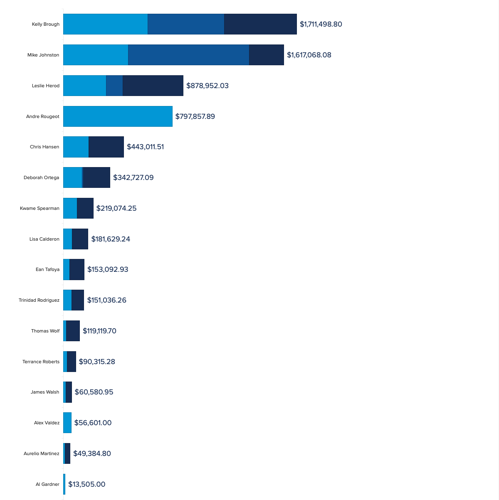Outside groups with well-oiled money machines have begun flexing their muscles in the Denver mayor's contest, shaking up the top spots in the money race with less than a month to go before Election Day and as ballots begin arriving in voter's mailboxes next week.
As if on cue, outside spending began to pile up.
Already, independent expenditure groups — entities that operate autonomously from candidates' campaigns — have poured in nearly $1.6 million in the crowded race to succeed Michael Hancock.
Kelly Brough, a former business chamber CEO, has maintained a fundraising edge. Counting all sources of help, including independent support, she hauled in $1.7 million to date.
But Mike Johnston, a former state legislator, is not far behind, having benefitted from nearly $900,000 in independent expenditures — all of it from a group called Advancing Denver.
The group received $228,000 from Reid Hoffman, a venture capitalist and partner at Greylock Partners. Hoffman co-founded LinkedIn and is a board member at Microsoft.
Kent Thiry, the former CEO of DaVita, also contributed $150,000 to Advancing Denver. A financial heavyweight, Thiry is a familiar figure in Colorado's political scene, having poured significant sums into statewide ballot measures, including the proposals that established the state's open primary system and created independent redistricting commissions.
Counting outside help, Johnston took in roughly $1.6 million. Without the outside help, he raised $728,000.
Brough, meanwhile, benefited from about $563,000 in outside support. The contributors to the outside entities helping her include the National Association of REALTORS, which gave $150,000. Other big contributions came from Amacon Management LLC, the Apartment Association of Metro Denver, Avanti Residential, Freyer Investments LLC and Paradise Investment properties LLC, which gave $25,000 each.
Not counting money from independent groups, Brough raised $617,872 and received $530,491 from the city's Fair Elections Fund, a voter-approved public financing model that matches donations of up to $50 at a ratio of 9 to1.
This makes her the first candidate to cross the $1 million mark, with a little more than $1.1 million raised — not counting outside support.
The other top fundraisers — again not counting outside help — are Andy Rougeot, a business owner, who hauled in just under $800,000; Leslie Herod, who took in about $757,000; and state Sen. Chris Hansen at $443,000.
A SurveyUSA poll of likely voters shows Brough, Johnston and Lisa Calderón sharing the lead in the 17-candidate field — though only barely — with 5% support for each, just outside the poll’s margin of error.
A whopping 58% of those surveyed say they’re undecided, according to the poll, which was commissioned by The Denver Gazette/Colorado Politics, 9News and Metropolitan State University.
The poll also shows state Sen. Chris Hansen and at-large councilwoman Debbie Ortega have 4% support each, with state Rep. Leslie Herod, Al Gardner and Thomas Wolf bunched up behind them at 3% apiece.
The new mayor faces gargantuan challenges magnified by Denver’s unique characteristics, notably a homelessness problem, a housing affordability issue and public safety. The new mayor will also need to resolve lingering problems, including the city’s ability to pick up trash on time, as well perennial ones, including Denver’s snow plow issues.
Ballots for Denver's 2023 municipal elections begin mailing Monday. Election day is April 4. The top two candidates in the race will continue on to a runoff election in June if no candidate receives more than 50% of the vote.





